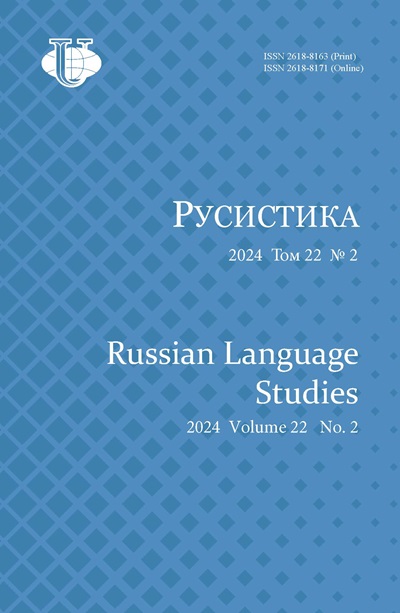Issue
Title
Authors
|
Mamontov A.S., Boguslavskaya V.V., Ratnikova A.G. |
|
Dmitriyeva N.M., Chulkina N.L. |
|
Bozhenkova N.A., Rubleva E.V., Baharloo H. |
|
Matveenko E.E. |
|
Popova T.I., Kolesova D.V. |
|
Drozdova O.E. |
|
Kopzhasarova U.I., Beisenbaeva B.A., Kikimova A.T. |
|
Karelova M.A. |
|
Ruban А.Е. |
|
Matveenko V.E. |
|
Маklakova Е.А. |
|
Ratsiburskaya L.V., Zhdanova E.A. |
|
Pashkovskaya S.S. |
|
Budiltseva M.B., Novikova N.S. |
|
Kostromin A.B. |
|
Faje Fatu Diop -. |
|
Belova M.A., Shaklein V.M. |
|
Passov E.I. |
|
Novikova M.L., Krapivnaya I.M. |
|
Tsareva N.Y., Budiltseva M.B. |
|
Skorikova T.P. |
|
Nikitin O.V. |
|
Abbasova A.A., Khilkevich S.V., Iurmanova S.A. |
|
Skorikova T.P. |
|
Lumpova L.N., Ryzhova N.V. |
|
Stepanova V.V., Kiseleva L.A. |
|
Fedotova N.L., Miller L.V. |
|
Kurguzenkova Z.V. |
|
Senatorova O.A. |
|
Emelyanova T.V. |
|
Kurguzenkova Z.V. |
|
Pryadko I.P. |
|
Nikalayenko S.V. |
|
Khavronina S.A., Gulyayeva I.V. |
|
Seriogina М.А. |
|
Kurtseva Z.I., Erokhina E.L. |
|
Matveenko V.E. |
|
Rubakova I.I. |
|
Batyushkina M.V. |
|
Antipova N.B. |
|
Levanova T.V. |
|
Zyukina Z.S. |
|
Burina Е.V. |
|
Koltsova L.M., Kudryavtseva T.Y., Churikov S.A. |
|
Arzyamova O.V. |
|
Balihina T.M. |
|
Alieva D.A., Onalbaeva A.T. |
|
Novikova M.L. |
|
Amar Ali Setti -. |
|
Alimova M.V. |
|
Ershov V.I., Nelyubova N.Y., Semyonov A.L. |
|
Efimova S.V. |
|
Bai Y., Zheltukhina M.R. |
|
Vinogradov S.N. |
|
Sotova I.A. |
|
Yao J. |
|
Skorikova T.P. |
|
Ivanov D.I. |
|
Iljina S.A., Ivanova I.S. |
|
Deryabina S.A. |
|
Bobrova S.E. |
|
Krotova T.A. |
|
Tretyakova L.N. |
|
Kryuchkova L.S. |
|
Vinogradov S.N. |
|
Martiryan N.I. |
|
Makarova V., Terekhova N. |
|
Azimov E.G. |
|
Wik N.O. |
|
Matienko A.V. |
|
Akhnina K.V. |
|
Cui L. |
|
Malyov A.V., Mosalova A.I. |
|
Matveenko V.E. |
|
Nikulina M.A. |
|
Ballod I.V. |
|
Romanenko V.А. |
|
Kidyamkina S.A. |
|
Loginova I.M. |
|
Miroshnichenko A.V. |
|
Zagidullina M.V., Kiklewicz A.K. |
|
Vasileva G.M. |
|
Skorikova T.P. |
|
Mokienko V.M. |
|
Zakharova E.A. |
|
Ermakova M.A. |
|
Skomarovskaya A.A. |
|
Deryabina S.A., Dyakova T.A. |
|
Kostromin A.B. |
|
Arslanova O.R. |
|
Zyukina Z.S. |
|
Romanenko V.A. |
|
Deryabina S.A., Dyakova T.A. |
|
Kopnina G.A., Koshkarova N.N., Skovorodnikov A.P. |
|
Kulsha D.N., Ryabokoneva O.V. |
|
Bozhenkova N.A., Bozhenkova R.K., Shulgina N.P. |
|
Bozhenkova N.A., Bozhenkova R.K., Bozhenkova A.M. |
|
Ephimova O.S., Krivosheeva E.N., Platonova E.K. |
|
Galchuk L.M. |
|
Orlov E.A. |











